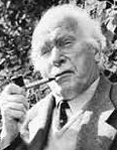 In Modern Man in Search of a Soul, Carl Jung explains why the cause of a neurosis is not as important as what the neurosis tells the patient about his own psychic needs:
In Modern Man in Search of a Soul, Carl Jung explains why the cause of a neurosis is not as important as what the neurosis tells the patient about his own psychic needs:
For the time being we will content ourselves with this hint, and return to the question whether dreams enable us to explain the causes of a neurosis. I have cited two dreams that actually do this. But I could equally well cite any number of initial dreams which do nothing of the kind, although they are perfectly transparent. I do not wish for the present to consider dreams which call for searching analysis and interpretation.
The point is that there are neuroses whose actual origins we discover only at the very end of an analysis, and there are also cases in which it is of no benefit to have discovered the origin of the neurosis. This brings me back to the Freudian view, mentioned above, that for the purposes of therapy it is necessary for the patient to become conscious of the causal factors in his disturbance—a view that is little more than a survival of the old theory of the trauma. I do not, of course, deny that many neuroses have a traumatic origin; I simply contest the notion that all neuroses are of this nature and arise without exception from some crucial experience of childhood. This view of the question results in a causalistic approach. The doctor must give his whole attention to the patient’s past; he must always ask: “Why?” and neglect the equally pertinent question: “What for?” This is frequently very harmful to the patient, for he is forced to search in his memory—perhaps over a course of years—for a hypothetical event in his childhood, while things of immediate importance are grossly neglected.
A purely causalistic approach is too narrow to do justice to the true significance, either of the dream, or of the neurosis. A person is biased who turns to dreams for the sole purpose of discovering the hidden cause of the neurosis, for he leaves aside the larger part of the dream’s actual contribution. The dreams I have cited unmistakably present the ætiological factors in the neurosis; but it is clear that they also offer a prognosis or anticipation of the future and a suggestion as to the course of treatment as well. We must furthermore bear in mind that a great many dreams do not touch upon the causes of the neurosis, but treat of quite different matters—among others, of the patient’s attitude to the doctor.
Excerpt from the C.G. Jung ebook, Modern Man in Search of a Soul